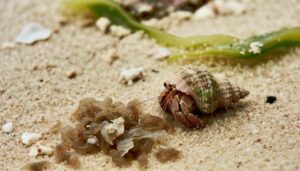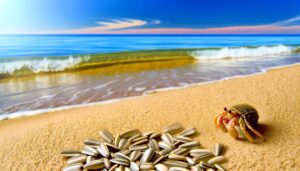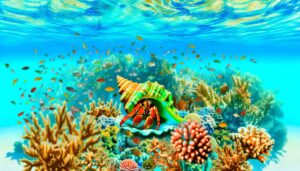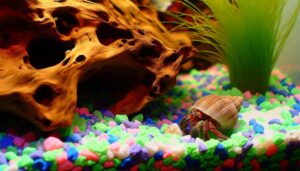Hermit Crabs Eat Bacon?
No, hermit crabs shouldn't drink purified water. Purified water lacks essential minerals like calcium and magnesium, which are critical for their osmoregulation and exoskeleton integrity.
Providing only purified water can lead to weakened exoskeletons, dehydration, and increased stress susceptibility. Instead, use dechlorinated tap water enriched with marine salt to mimic their natural habitat.
This guarantees they receive necessary minerals and ions. Keep both fresh and saltwater sources readily available.
These practices support hydration, immune response, and overall health. To ensure top care, discover why these specific water types make a difference.
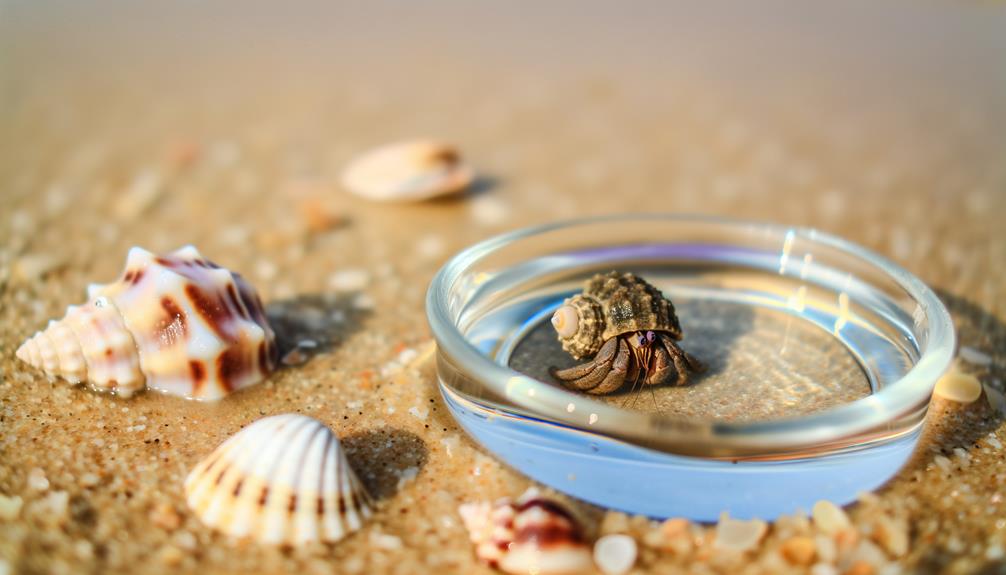
Key Takeaways
- Hermit crabs should not drink distilled water due to the absence of essential minerals.
- Distilled water lacks critical ions like calcium and magnesium, necessary for hermit crab health.
- Usage of distilled water can lead to dehydration and weakened exoskeletons in hermit crabs.
- Dechlorinated water enriched with marine salt is a better alternative for hermit crab hydration.
- Providing both freshwater and saltwater sources is crucial for maintaining hermit crab health.
Understanding Hermit Crab Hydration
Hydration is crucial for hermit crabs, as it directly impacts their osmoregulation and overall health. You must make sure they've access to both saltwater and freshwater, as these contribute to their ionic balance and enable proper physiological functions.
Dehydration can lead to lethargy, molting issues, and even mortality. Empirical studies show that hermit crabs regulate their internal water balance through specialized gills and antennal glands. By maintaining ideal hydration, you're supporting their immune response and exoskeleton integrity.
Providing the right water sources ensures your hermit crabs can effectively manage their hydration levels. Remember, your role in their well-being hinges on understanding these hydration dynamics and acting accordingly to meet their specific needs.
Properties of Distilled Water
Distilled water, characterized by its lack of minerals and impurities, offers a unique profile that impacts its suitability for hermit crabs. This type of water undergoes distillation, a process that involves boiling water and then condensing the steam back into liquid, effectively removing dissolved solids and contaminants.
You'll find that distilled water has a neutral pH of 7, ensuring it's neither acidic nor alkaline.
However, it's worth mentioning that the removal of essential minerals like calcium, magnesium, and potassium can alter the osmotic balance for hermit crabs. These minerals are vital for their exoskeleton health and overall physiological functions.
Empirical evidence suggests that water devoid of these elements may not meet the specific hydration needs of hermit crabs.
Risks of Using Distilled Water
The absence of essential minerals in distilled water poses significant risks to hermit crabs, potentially leading to deficiencies that compromise their exoskeleton integrity and overall health. Distilled water lacks critical ions like calcium and magnesium, essential for exoskeleton calcification.
Empirical evidence indicates that hermit crabs require these minerals to maintain structural strength and proper molting cycles. Without them, your hermit crab could suffer from weakened exoskeletons, increased susceptibility to stress, and impaired physiological functions.
Additionally, the osmoregulatory balance can be disrupted, leading to dehydration and metabolic imbalances. By using distilled water, you're inadvertently depriving your hermit crabs of the necessary elements they need for peak health, thereby jeopardizing their well-being and longevity.
Alternatives to Distilled Water
Considering the vital minerals hermit crabs need, using dechlorinated tap water enriched with marine salt offers a balanced and effective alternative. This method guarantees the provision of critical ions and trace minerals, which distilled water lacks.
Empirical studies have shown that hermit crabs thrive in environments where water mimics their natural habitat's salinity and mineral content.
To prepare this ideal hydration solution, consider these steps:
- Dechlorinate tap water: Neutralize harmful chlorine and chloramines.
- Add marine salt: Follow manufacturer's guidelines for correct salinity levels.
- Monitor water quality: Regularly test for contaminants and mineral balance.
- Ensure accessibility: Keep both fresh and saltwater pools easily reachable within the habitat.
Best Practices for Hydrating Hermit Crabs
Implementing top practices for hydrating hermit crabs involves careful attention to water quality, salinity, and accessibility within their habitat. You'll need to provide both fresh and saltwater sources.
Use dechlorinated tap water or spring water for freshwater, as distilled water lacks essential minerals. For saltwater, mix marine-grade salt with dechlorinated water to achieve appropriate salinity levels (specific gravity of 1.020-1.025).
Guarantee containers are shallow and easily accessible to prevent drowning. Regularly clean and refill water dishes to maintain hygiene and prevent bacterial growth.
Empirical studies suggest that proper hydration significantly impacts hermit crabs' molting success and overall health. By adhering to these top practices, you're ensuring the prime well-being of your hermit crabs.
Conclusion
Essentially, you shouldn't use distilled water for hydrating your hermit crabs. It lacks vital minerals, which could result in dehydration and health problems.
Instead, choose dechlorinated tap water or marine-grade saltwater. Consider it as offering your hermit crabs the essential fluid they require to flourish.
Keep in mind, proper hydration is crucial for these sensitive creatures. By selecting the appropriate water source, you're safeguarding their health and longevity, much like offering them a vital support system.

